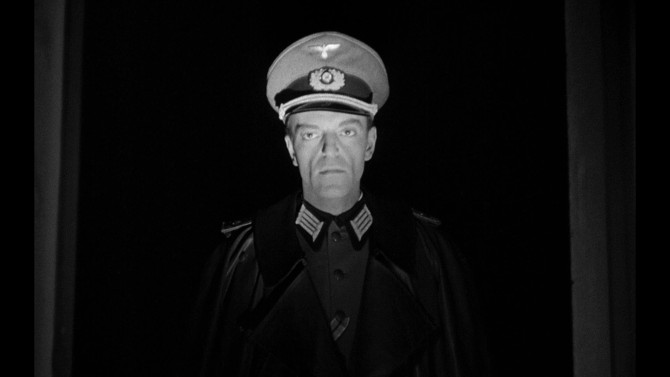Made with a surprisingly nuanced touch and a quiet grace by a first time filmmaker, Jean-Pierre Melville’s (Le Samouraï) 1949 drama Le Silence de la Mer is a philosophical study in how the lives of two individuals are affected when an occupying German soldier billets at their house, and, in turn, how living in their home changes him during World War II.
Based upon Jean Bruller’s text of the same name (which he published under the nom de plume Vercors), it became a symbol of resistance against the Nazi occupation of France (Melville himself was a part of the French Resistance, as was Bruller). As an interesting sidenote, Bruller discovered that Melville was planning on making the movie without the rights to his work. Meeting up with the filmmaker, he threatened to burn the negative if he did not like it, yet he allowed him to make the movie in his own home just outside of Paris. The pact was that Bruller would show his version to 24 former Resistance members and that they would have to unanimously give it their blessing (or Melville would burn the negative in front of the author). 23 of 24 voted in favour, the sole individual to go against the crowd did so not because he disagreed with the content of the film, but rather, how he found himself as part of the panel (as a last minute substitute – which offended him). Melville won out and Le Silence de la Mer became a huge hit in France.
Filmed in Bruller’s sizeable home, the story is narrated by the unnamed, pipe smoking elder Frenchman (Jean-Marie Robain), who lives with his much younger niece (Nicole Stéphane). Soon, the German lieutenant, Werner von Ebrennac (Howard Vernon), is knocking on the door, intruding in their lives. The only form of resistance they can muster is to remain silent any time the man enters the room and speaks.
It does not seem to bother the foreigner, as he enjoys entering their sitting room each night, speaking in monologues about everything from the war and France, to literature and the future. Soon, the silent duo come to appreciate the soldier, realizing that he is a hopeful idealist – not some sort of vile monster. Despite this, they do not waver from their protestation of having one of the enemy in their own home.
Creating a unique method of film making, Le Silence de la Mer was a major influence on the French New-Wave. Utilizing natural light due to a minuscule budget, Melville breaks away from the traditions of the classic Hollywood pictures of the 1930s and early 40s (which he loved). Seeing no reason to recreate perfection, he developed this story that breaks away from formulaic methods – as the uncle and niece nearly never speak (unless it is through the Frenchman’s narration) – which has led many to call it anti-cinematographic. Clearly experimental in nature, we must read between the lines, observing the faces (and hands) of our main players, as well as the brilliant use of shadow and light, to truly understand the three major characters.
Sound is also a vital part of the motion picture. It may surprise some that there is actually quite a bit of dialogue, since so much of the script revolves around mute protestation. But it is also the noises of the house and its occupants – a crackling fire, creaking floorboards, the tick tock of a clock, and the mismatched footsteps of the limping German, that add realistic depth to the minimalist project. It also features a wonderful score from Edgar Bischoff, sweepingly majestic for its tiny budget.
At the heart of the picture is Vernon’s performance as Ebrennac, as it is he who brings forth the complex dichotomous nature of the movie. Melville and cameraman Henri Decae vividly etch the man’s chiselled, angular and somewhat gaunt face with an array of shades, from bright light to near blacks, though most of the time his visage is partly covered in shadow (once again highlighting the complexity of this multi-faceted man). For instance, his love of France and his theory that the Germans will thrive and blossom thanks to a union between the two countries is echoed in his unspoken love for the niece, and though it is never to be (much like the German’s fantastical vision – as he is naïve in truly understanding the Nazi agenda), it is not wholly rejected by the stoic young woman despite her silence.
Thus, it is this breathtaking, rich performance (along with the impassive personas brought forth by the two French actors) that gives the film its heart. It is not a movie filled with action; it is a small budgeted independent picture that flourishes thanks to the performances, scenario and the striking cinematic technique brought forth by Melville and his bare-bones staff. So, hopefully I’ve broken the silence by writing about this somewhat forgotten gem – please don’t resist seeing this classic flick, you won’t regret it.

